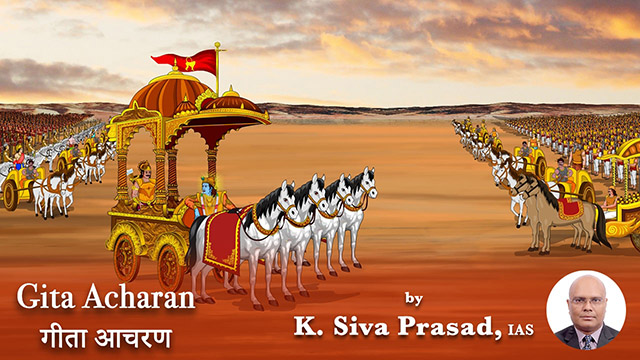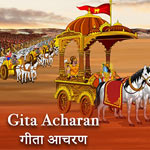
Krishna says, "A person who doesn't agitate (𝙪𝙙𝙫𝙚𝙜) the world and who is not agitated by the world, who is free from pleasure, jealousy, fear and anxiety; who is free from expectations, pure, skillful, neutral to circumstances, free from selfishness in all undertakings -he (devotee) is dear to Me" (12.15 and 12.16). 'Not getting agitated and not agitating others' is the highest form of living.
Krishna earlier answered the question of why we get agitated. He said that the polarities of pain and pleasure (𝙨𝙪𝙠𝙝-𝙙𝙪𝙠𝙝) are generated in us when senses meet sense objects like when ears hear our praise or criticism. He advised us to learn to ignore them (polarities) as they are 𝙖𝙣𝙞𝙩𝙮𝙖 (impermanent) (2.14). These polarities are nothing but the agitations we go through.
In our daily lives, agitation works like the game of 'passing the buck'. For example, we gather agitation from a superior in the workplace and pass it on to some junior or to a family member at home. But Krishna says neither to take agitation nor give it. This is certainly a challenging task.
Krishna gave the example of the ocean and river and assured that one attains peace when one remains unmoved by desires or agitation, like an ocean that is unmoved by the waters entering it (2.70). Though the ocean is not agitated with the waters entering into it, it gives back this water as clouds which Krishna described as an unmotivated action ( 𝙣𝙞𝙨𝙬𝙖𝙧𝙩𝙝 𝙠𝙖𝙧𝙢𝙖 ) of ' 𝙮𝙖𝙜𝙣𝙖 '. When we participate in the cycle of unmotivated actions, the agitation will not have any place in our lives.
While awareness helps us get ourselves free from agitation, our compassion helps us ensure that we don't agitate others. That's why it is said that awareness and compassion are two oars of the boat in the spiritual journey.

